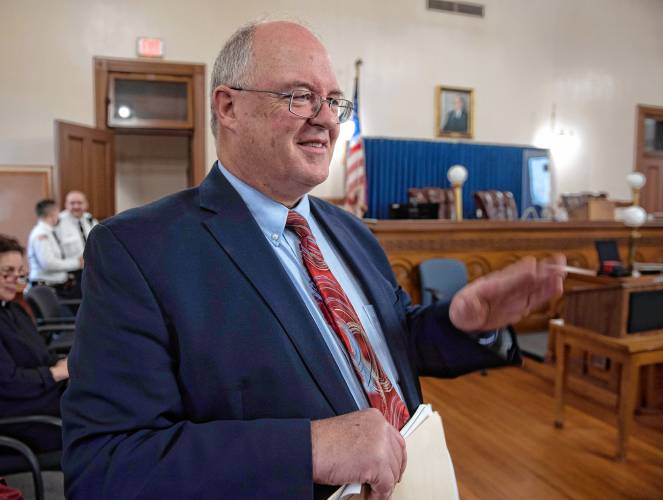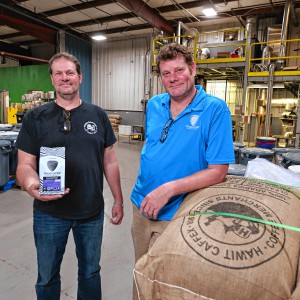DA Sullivan presses for legal drug-use sites at State House hearing, saying need has never been more urgent

Northwestern District Attorney David E. Sullivan testified Monday in favor of proposed legislation that would give municipalities permission to open so-called overdose prevention centers. FILE PHOTO
| Published: 10-24-2023 4:22 PM |
BOSTON — Stressing that the need for legal drug consumption sites would save hundreds of lives and that there wasn’t a moment to waste, Northwestern District Attorney David Sullivan implored lawmakers on Monday to muster up the courage to pass legislation before them that would give municipalities permission to open the so-called overdose prevention centers.
“The placement of safe consumption sites to address the fentanyl epidemic has never been more urgent and necessary,” Sullivan told the Joint Committee on Mental Health, Substance Use and Recovery during six hours of testimony. “We are just asking for a safe place with a clean syringe and a caring person to supervise.”
The legislation proposed by Reps. Dylan Fernandes and Marjorie Decker and Sen. Julian Cyr ( H 1981 / S 1242) calls for a 10-year pilot program through which communities could open the supervised centers, also called injection sites.
Under the proposals, people with substance use addiction could take pre-obtained drugs at the centers while being supervised by trained staff who could help prevent the spread of infectious diseases like HIV, respond to potential overdoses, provide access to naloxone, and connect participants to treatment or other services.
Committee chairman Sen. John Velis, D-Westfield, signaled that policymakers are still awaiting guidance about the legality of those facilities from the federal government, amid an ongoing legal battle between the Department of Justice and a nonprofit looking to open a supervised injection site in Philadelphia.
“Again, raising that question about the legal landscape if we go forward with this, where is the federal government?” Velis said. “If it sounds like I’m frustrated, I am.”
Velis also acknowledged New York City has opened a supervised injection site, and the first such facility in Rhode Island is slated to open in Providence early 2024 after the state legalized the centers in 2020, according to The Public’s Radio. The senator implored colleagues at the start of the hearing to consider harm reduction strategies that have already been implemented.
Sullivan, however, urged the committee to press onward with legalization.
Article continues after...
Yesterday's Most Read Articles
 Fogbuster Coffee Works, formerly Pierce Brothers, celebrating 30 years in business
Fogbuster Coffee Works, formerly Pierce Brothers, celebrating 30 years in business
 Real Estate Transactions: May 3, 2024
Real Estate Transactions: May 3, 2024
 Greenfield homicide victim to be memorialized in Pittsfield
Greenfield homicide victim to be memorialized in Pittsfield
 Softball: Franklin Tech pulls away from Hopkins, 8-3 (PHOTOS)
Softball: Franklin Tech pulls away from Hopkins, 8-3 (PHOTOS)
 As I See It: Between Israel and Palestine: Which side should we be on, and why?
As I See It: Between Israel and Palestine: Which side should we be on, and why?
 Bridge of Flowers in Shelburne Falls to open on plant sale day, May 11
Bridge of Flowers in Shelburne Falls to open on plant sale day, May 11
“For over 220 years, local and state governments have controlled public health and this is a public health crisis,” he said. “So I think that Massachusetts, under the 11th Amendment, has the opportunity to bring this forward. So legalize it, and then fight it in federal court and even before the Supreme Judicial Court. We have a great attorney general’s office — they defend our statutes all the time.”
Joining Sullivan on Beacon Hill Monday was Liz Whynott, director of harm reduction at Tapestry Health in Northampton, who said the talk around consumption sites reminded her of discussions that took place about needle exchange programs before they were made legal in Massachusetts. Tapestry implemented needle exchanges beginning in the 1990s, the first such implementation in the state outside of Boston
Whynott also spoke about her own past struggles with addiction, and that the situation now was even more dire with the introduction of fentanyl.
“If I was 10 or 20 years younger, I might not be alive,” Whynott said. “I think there’s a lot of people like me who are no longer using heroin that are all questioning if we would be alive.”
Her statement drew applause from those attending the hearing.
Overdose prevention centers already exist in several other countries, including in Canada, Germany and Portugal, but, as Velis notes, it remains questionable whether such sites are permitted under United States federal law, which makes it illegal for facilities to store, use or sell controlled substances.
Sullivan said he had personally visited consumption sites in Toronto and Berlin, and that the sites tend to be safe and that no overdose has occurred at those locations.
Sullivan’s testimony received pushback from Sen. Nick Collins of the First Suffolk District, who said that while Sullivan represented western Massachusetts, the major consumption sites in the state would likely be in Collins’ district in Boston, home to the Mass and Cass area populated by large numbers of homeless and those struggling with addiction.
“Proponents who are talking about putting them [safe injection sites] in my district that live in western Mass, and that’s another part of the problem,” he said.
Sullivan acknowledged that Mass and Cass was a “blight” for Boston, but that consumption sites tended to be neutral areas and a site could perhaps be set up nearby rather than directly in the area. He asked lawmakers to have the “courage to pass this legislation,” as he also reminded them about the Constitution’s limits on federal and state courts to hear certain cases.
Massachusetts logged 2,357 confirmed and estimated fatal opioid-related overdoses last year, a record high that disproportionately affected non-Hispanic Black residents.
There have been zero overdoses at the roughly 200 supervised consumption sites operating in 14 countries, according to Massachusetts for Overdose Prevention Centers, a coalition of more than 30 hospitals, public health advocacy groups, public safety groups and other organizations that support the proposals on Beacon Hill.
A poll released by the coalition last week found that 70% of Massachusetts voters surveyed also support the legislation.
State House News Service contributed to this report.

 Community Legal Aid expands Disability Benefits Project to Franklin County
Community Legal Aid expands Disability Benefits Project to Franklin County Wear Orange organizers prepare display to remember gun violence victims
Wear Orange organizers prepare display to remember gun violence victims Deerfield candidates, Whately incumbent discuss issues with voters at South County Senior Center
Deerfield candidates, Whately incumbent discuss issues with voters at South County Senior Center
